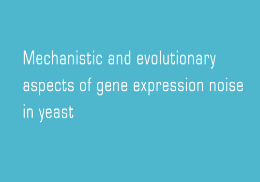
JOHN MCCARTHY. Date: 14 April 2016. Hour: 12:30. Venue: Sala d’Actes dels Instituts (Edifici de Capçalera, Parc Científic, Universitat de València). Organizer: Institute for Integrative Systems Biology I2SysBio (UV-CSIC). Host: Juli Pereto.
Abstract
Gene expression stochasticity (or noise) is thought to be a critical source of non-genetic cellular diversity, from microbes to mammals, and to be involved in cellular decision-making. By creating phenotypic diversity for otherwise genetically identical cells, stochasticity is crucial for optimised resource utilisation and adaptation of microorganisms to a stressful fluctuating environment. In fact, it allows organisms to generate variant subpopulations of cells that often have a decreased fitness in their current environment but may adapt better to environmental change. This is known as a “bet-hedging” strategy and is widespread among microorganisms that manifest mechanisms such as bacterial persistence, sporulation and competence. Evolution as we currently understand it could not have occurred without noise. Recent analysis indicates that gene expression noise reduces mean fitness in yeast by at least 25%. It has been widely assumed that the predominant source of this noise is transcription. However, in this talk I will demonstrate that this is an oversimplification. The yeast cell commits a large percentage (>76%) of its ‘energy budget’ to protein synthesis. Therefore rate control and noise management in the translation machinery will have major impacts on organism fitness. I will outline what we have learned about the ‘rules’ determining the relationship between mechanism, rate control and limits of noise generation for components of the translation machinery.
About. John McCarthy.
Professor of Molecular Systems Biology and Director of Warwick Integrative Synthetic Biology centre (WISB), University of Warwick, UK
john.mccarthy@warwick.ac.uk
John McCarthy studied Biochemistry in Oxford and began his research career studying the biochemistry and biophysics of electron transport–dependent ATP synthesis. In subsequent years in Germany he switched to research on mechanisms underpinning the control and regulation of gene expression and became a Department Head in one of Germany’s Federal Research Institutes. He also engaged with various challenges in biotechnology, collaborating with a large number of biotechnology and pharmaceutical companies. John moved to Manchester in 1996, where he was Head of the Department of Biomolecular Sciences at UMIST 1998-2000. He took on leadership of the Manchester Interdisciplinary Biocentre project in 1998, and was Director of this institute from 2004 until 2010, when he moved to become Head of Life Sciences at the University of Warwick. John was the recipient of a Wolfson-Royal Society Merit Award in 2002, and was awarded a BBSRC Professorial Fellowship in 2007. John is currently Director of the BBSRC/EPSRC-funded Warwick Integrative Synthetic Biology centre (WISB). He has organised many international scientific conferences and international postgraduate training courses, with an increasing focus on novel interdisciplinary research areas, and was one of the founding Editors of the RSC journal Integrative Biology. His current research interests include rate control and noise in the eukaryotic gene expression pathway, and a range of synthetic biology projects.
Images:













